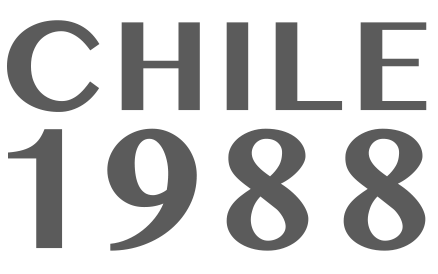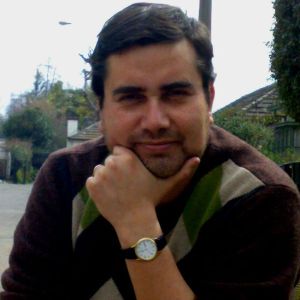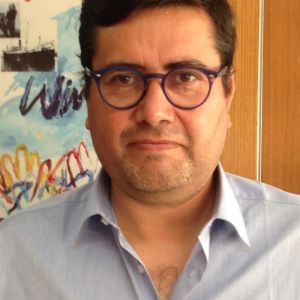Well, you see, for the 1988 plebiscite, I was living in Pichilemu. I was in my first year of university, but I still had my residence in Pichilemu. That’s in the sixth region, the O’Higgins region. During my final years of high school, which I studied at the local high school, we had been very actively involved in political-cultural organizations that started with the visit of the Pope. Across Chile, work was carried out under the auspices of the Catholic Church, which allowed many of us young people in high school to have contact not only with the Pope and Catholic Church leaders, but also with many renowned political figures. I remember that, in organizing the Pope’s visit, an activity was organized in provincia called “El Cristo Peregrino” (The Pilgrim Christ), which aimed to build community and form community networks in the context of dictatorship. After many years of repression, this activity involved households having an image of Christ in their homes, which was passed from house to house, fostering reflection and ultimately building the first bonds and networks after the coup. I see a relationship of continuity between the organization of the Pope’s visit and the construction, let’s say, of organizations for the 1988 plebiscite.
I was in Pichilemu. Indeed, it was the first election in which I had the opportunity to participate. I had just reached the legal voting age, and I was appointed as a voting table officer. I still remember at Table 14 in the public school of Pichilemu, which was the only polling station, Francisco Javier Errázuriz was voting. It was anticipated that he would run as a presidential candidate the following year, so there was a lot of media coverage. I was an 18-year-old young man, recently turned 18, and I was very nervous because I would receive media coverage that I didn’t want, and I was also afraid of making mistakes, to screw it up, as they say. I also remember that people in the countryside participated in that 1988 election with a lot of fear. There were some exotic theories that, for some reason, someone would know how you voted. So, there was a lot of fear, a lot of apprehension. I even remember hearing that someone in the countryside asked if it was possible for their vote to be identified from some place in outer space in the secret ballot box. So, the imagination was running high, mainly because it was an electorate with little information, rural, and very fearful after 17 years of dictatorship.
I remember that we woke up very early at 6 o’clock in the morning or five-thirty in the morning, we went to organize the representatives for the electoral process. We arrived at the polling center very early and everything went relatively normal. I went home around nine o’clock at night, and there we glued ourselves to the television with a lot of uncertainty about whether an eventual victory for the No would be recognized and legitimized by the Junta. I think it was a shared fear that a win for the No could generate a scenario where Pinochet would not recognize the adverse result of the plebiscite. Therefore, I believe that on that night, the majority of the country experienced a common feeling, which was being in a trance, in a historically dramatic situation. Knowing that we were one step away from making history and reclaiming democracy. But it was also a step towards the precipice where there could have been a self-affirming act by the dictatorship to remain in power against the will of the people. So I think all of us who participated there, especially the younger ones who were participating for the first time in an electoral process, felt that we were exposed, we were a little afraid, and therefore, everything that happened that night, with General Matthei’s declaration, was very important, so to speak, to start believing that this path to democracy in Chile was possible.
I also believe that the more traditional actors of the right-wing, who quickly declared that the result of the plebiscite had to be accepted, were building a somewhat more confident emotional situation around midnight because the results took a long time to come out. What can I say about my personal process of working for the 1988 plebiscite? What I can say is that indeed, despite the fear and the threat that it meant to expose oneself as an opposition actor in a dictatorship context, community relations in small towns like Pichilemu had other mediations. It had a different meaning because there was indeed polarization. You could recognize in a small town who were supporters of the Yes and who were supporters of the No. But it is also true that the experience of life in Provincia somehow attenuated the ideological division. I even remember that during the toughest moments of the dictatorship repression when the military from the Colchagua Regiment arrived in Pichilemu in the 1970s, they would come in trucks, they would line up on the main avenue, Ortúzar Avenue, which leads to the main beach of Pichilemu. They would sound their horns and start filling places where they believed there were communists or socialists in hiding. But the carabineros, the police officers in Chile, who were much more integrated into the community, when they knew that the Colchagua Regiment was coming to Pichilemu, they usually warned their socialist or communist friends, with whom they shared a common life in a cantina or while enjoying a good drink, a glass of wine, or playing dominoes. In small towns, there is a lot of close interaction regardless of your political positioning. I remember the image of the carabineros running and warning the socialist household to run because the carabineros were coming and would arrive in two or three hours. That seems quite unique. In small towns like Pichilemu, where the national conflict is distorted by face-to-face relationships, affective relationships, and even close family relationships. So national politics does not translate mechanically at the community level. There are certain distortions. Luckily, we could say, that give a different meaning to the political conflict at the local level. I remember two or three occasions when that happened, and I also remember that during the organization of the plebiscite, there were gatherings and, except for a couple of times when Special Forces from San Fernando arrived and there was repression, it had a certain playful character to be on one side or the other, which I think was not the climate that prevailed in the rest of the country. Because the following year, I went to university, I started studying History in Valparaíso at the Catholic University of Valparaíso, and none of the confrontations between the plebiscite and the presidential election that year had the playful character they had in Pichilemu. So being on one side or the other could make the difference between being shot or hit by a rubber bullet in the leg or not. That was not at stake in Pichilemu. Perhaps a few harsh words or a couple of punches in the face were at stake. The community relationship, so to speak, gives a different meaning to the national conflict.
I must also say that in my formative political experience, having lived through the entire stage leading up to the plebiscite meant the opportunity to meet probably the main leaders of the opposition to Pinochet. In Pichilemu, there is the house of a distinguished Pichilenino, Lucho Alvarado. Luis Alvarado, who was the Minister of National Assets during the government of Patricio Aylwin, and his daughter and family still visit Pichilemu as their second home. In Luis Alvarado’s house, diverse yet significant figures would gather, such as Adolfo Zaldívar, Luis Maira, Jorge Arrate. I remember quite a number of democrats, Christian Democrat Gabriel Valdés. I recall at some point seeing them in Pichilemu, in a nightlife venue or a restaurant, and they would often invite local people. They even organized some activities to recruit young people at the regional level in political training schools. In that sense, I feel like a privileged witness to the process of organizing the opposition because, living in a small town, I was fortunate to be in a place that, at certain moments before 1988, was a meeting point for a part of the elite that was once the Democratic Alliance and later became the Concertación de Partidos Políticos.


